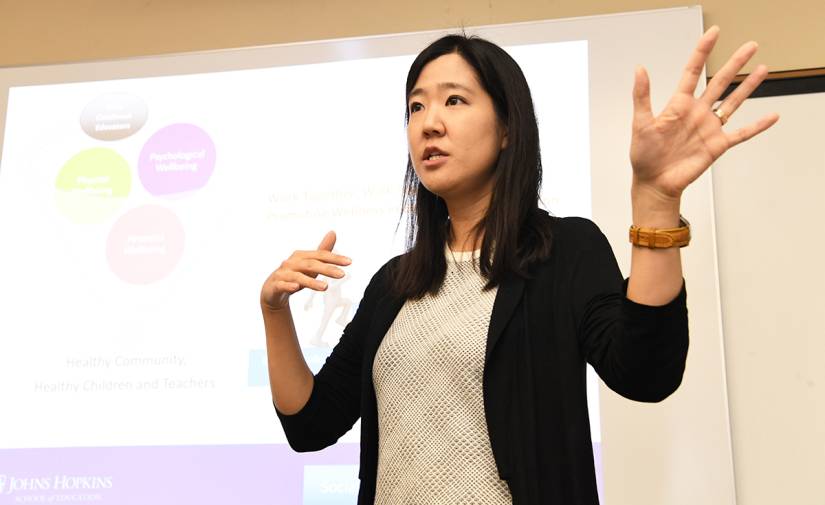Among the country's many overburdened teachers, those who teach Head Start may fare worst. Underpaid, overworked, and often unsupported, Head Start teachers consistently report high rates of stress, depression, and exhaustion. Many leave their jobs after only a few years. Consequently, the students who rely on their help suffer, too.
Understanding and improving this sobering outlook has become a priority for the U.S. Department of Health and Human Service's Administration for Children and Families, which oversees Head Start, a program designed to give millions of American children from low-income families a leg up on their academic futures.

Image caption: “For the first time, people are focusing on Head Start teachers’ care, well-being, and health, both physical and psychological," says Lieny Jeon, who is co-leading a study focused on burnout among teachers in low-income communities.
Into this void steps Lieny Jeon, associate professor at Johns Hopkins School of Education and an expert in early childhood education. Recently, DHHS announced a grant that will see Jeon co-lead a Head Start-university partnership in a five-year, $2.1 million study of burnout among Head Start educators—and, more importantly, well-being interventions to combat it. Her co-principal investigator is Amy Roberts of the University of Denver.
"This is the first-ever federal study to look specifically at Head Start teacher well-being," Jeon said. "It's a unique group among early childhood educators. They are usually a little better paid than most in the field due to the federal funding, but they still experience high burnout and turnover. In better understanding the causes, the consequences and the solutions for this burnout, we can help build resilience in this important group."
Jeon and collaborators call it the "Well-Being First Model." It will address well-being issues at the individual and organizational levels through training, support groups, leadership initiatives, regular well-being consultations, and a helpful toolkit. But it all begins with an assessment of the current situation. In the first year of the study, Jeon will look at Baltimore City Head Start programs with help from a Head Start collaborative consisting of four Head Start grantees—Baltimore City Head Start, Y Maryland, Catholic Charities, and St. Vincent de Paul.
Jeon stresses that the problem is not simply a matter of compensation. Head Start teachers are committed individuals who know the realities before they enter the profession. Since many Head Start teachers are resigned to living in poverty themselves, however, pay cannot be overlooked, but the problem goes deeper still. There is a psychological aspect to the problem.
"These teachers serve the most vulnerable children and families in the United States, so they tend to experience a lot of secondary traumatic stress," Jeon said. "When you see somebody who is traumatized, that trauma comes to you."
In a vicious cycle, the secondary trauma has a profound and lasting effect on the teachers. When those teachers feel alone, unappreciated and unsupported, the trauma has a demoralizing effect, which, in turn, is revisited on the students.
While the root problem is not hard to comprehend, what can be done to stop or reverse it is a much tougher conundrum. Jeon and colleagues, including her collaborators at Johns Hopkins— Arik Marcell in the School of Medicine and associate professor Yolanda Abel at the School of Education, as well as Jennifer Dale and Marilyn Muirhead of the Johns Hopkins Center for Technology in Education—will look at interventions that boost resilience through teachers' personal knowledge of their own well-being and improved relationships with the children, among other aspirations.
The first year of the study will be a developmental phase. The team will talk with Head Start teachers and administrators and conduct focus groups to ensure model makes sense, Jeon says. Year two and three will see a pilot test and randomized controlled trial to provide evidence of the program's effectiveness. Year five will see formal development and a wider rollout of the model.
"For the first time, people are focusing on Head Start teachers' care, well-being, and health, both physical and psychological," Jeon added. "It's a years-long intervention to help these important, but overworked teachers change their work environment and take care of themselves first and foremost. We need them to remain in the field for a long time to come."
Posted in Politics+Society
Tagged education, head start, lieny jeon








